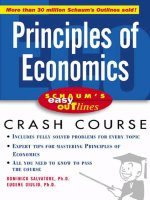Geo economics Ebook
Bạn đang xem bản rút gọn của tài liệu. Xem và tải ngay bản đầy đủ của tài liệu tại đây (4.69 MB, 302 trang )
Klaus Solberg Søilen
Geoeconomics
2
Download free eBooks at bookboon.com
Geoeconomics
© 2012 Klaus Solberg Søilen & bookboon.com
ISBN 978-87-403-0128-1
3
Download free eBooks at bookboon.com
Geoeconomics
Contents
Contents
Acknowledgements
7
1
From geopolitics to geoeconomics
8
2
he legacy of the discipline of geopolitics
21
2.1
he seduction of maps
27
2.2
he seduction of history
30
2.3
he seduction of current events
35
3
he renaissance of geopolitical thought
37
3.1
he Great Game
42
3.2
he conlict between Western and Asian values
45
4
Elements of geoeconomics
55
4.1
he doctrine of the Nareland
56
4.2
Normative intelligence analysis
59
4.3
A victory for historical materialism
61
4.4
Competitive advantage of nations: theories and realities
76
4.5
Nation states controlled by multinationals
89
4.6
Multinationals controlled by the nation state
92
www.sylvania.com
We do not reinvent
the wheel we reinvent
light.
Fascinating lighting offers an ininite spectrum of
possibilities: Innovative technologies and new
markets provide both opportunities and challenges.
An environment in which your expertise is in high
demand. Enjoy the supportive working atmosphere
within our global group and beneit from international
career paths. Implement sustainable ideas in close
cooperation with other specialists and contribute to
inluencing our future. Come and join us in reinventing
light every day.
Light is OSRAM
4
Download free eBooks at bookboon.com
Click on the ad to read more
Geoeconomics
Contents
5
Geoeconomics in relation to evolutionary theory
104
5.1
he organic view of social behaviour
107
5.2
Evolutionary theory versus environmental adaptation
110
5.3
Evolutionary economics and the competition between scientiic paradigms
115
6
Geoeconomic maxims
140
6.1
Key intelligence topics for the study of geoeconomics
146
6.2
Perspectives by topics and dimensions
148
6.3
Perspectives by geographical location
203
Bibliography
295
360°
thinking
.
Discover the truth at www.deloitte.ca/careers
© Deloitte & Touche LLP and affiliated entities.
5
Download free eBooks at bookboon.com
Click on the ad to read more
Geoeconomics
Dedicated to Jan Søilen
“Where is the wisdom we have lost in knowledge?
Where is the knowledge we have lost in information?”
– T.S. Eliot
6
Download free eBooks at bookboon.com
Geoeconomics
Acknowledgements
Acknowledgements
his book project began in the summer of 1998. I spent two weeks of that summer at Radi, a small village outside Siena,
discussing the contents of the MS with a sociologist and fellow doctoral student from the Zentrum für Höhere Studien
(ZHS) at the University of Leipzig, Andreas Westerwinter1. Our discussions were mostly about the value, if any, of the
discipline of geopolitics and the limited usefulness of neoclassical economics and modern political science for trying
to explain current economic events, in particular the emergence of China as an economic superpower. From a wider
methodological perspective the aim was to look at which ideas about the study of Man and social life which had been
neglected following the Second World War but might still be of value – in the irst instance, for my doctoral thesis. Most
of these ideas belong to what we should call evolutionary economics, or the “evolutionary approach”, today.
A irst drat deriving from these relections was presented briely to the ZHS at Wilhelm Ostwald’s Landsitz Haus Energie
in Großbothen the following year. he project of writing this book, however, made way for other priorities, particularly
research for the course I was teaching on business intelligence. Eventually, though, I felt a strong obligation, encouraged
not least by my students, to complete the book (which in MS form had been in use as a compendium for several years).
I also wanted to ofer the material to a larger audience, without compromising the book’s theoretical content.
Over recent years I have received numerous constructive comments on these notes from hundreds of master’s students and
a handful of fellow teachers of diferent nationalities. I am deeply thankful to them. his has not only helped to improve
successive annual versions of the compendium, but gave me an in-depth opportunity to learn how diferent cultures think
about the issues presented here.
I should like to thank Prof. Russell Berman for giving me the opportunity to produce a irst complete drat of the manuscript
as a visiting scholar at Stanford University in 2009. Many thanks also to the staf at the Green Library, and to the Swedish
Research Council, for co-inancing my stay at Stanford.
Furthermore I should like to thank Prof. Per Jenster for giving me time to work on the MS while a visiting scholar at
CEIBS, Shanghai, in 2008, and to Ann-Charlotte Oredsson for frequent comments on the MS (while wondering, no doubt,
whether it would ever be completed). I should also like to thank Joseph Le Bihan, my old teacher at HEC in France,
simply for inspiration. hanks to Karin Hamilton Jacobsen at Ventus Publishing and to Geofrey Sampson for editing the
manuscript. Finally, it goes without saying that all opinions and all faults found here are the author’s own.
Chengdu, February 2012
1
Westerwinter, whose thesis was on Wilhelm Wundt, was a member of the Ambivalenzen der Okzidentalisierung
(Ambivalences of Westernization) doctoral programme at Leipzig University.
7
Download free eBooks at bookboon.com
Geoeconomics
From geopolitics to geoeconomics
1 From geopolitics to geoeconomics
“Intelligence can’t live with theory and can’t live without it.”
Richard K. Betts (2007: 53)
he idea with this book is to show how the study of intelligence can be an alternative approach for the study of economics
when the aim is to understand the competitive advantage of nations. We shall describe the study of geoeconomics as
a part of normative2 intelligence analysis, written in the tradition of critical theory and based methodologically in the
evolutionary sciences.
his introduction aims to show the relationships among the disciplines of economics, geoeconomics, evolutionary theory,
evolutionary economics, strategy, intelligence studies, strategic intelligence, business intelligence, economic intelligence,
critical theory, and the historical method.
What geoeconomics is and who the study is relevant for
Geoeconomics is the study of spatial, cultural, and strategic aspects of resources, with the aim of gaining a sustainable competitive
advantage. It is a continuation of the logic of geopolitics, applied to the era of globalization. Consequently the study is
most relevant in the context of larger strategic entities, such as nations and multinational enterprises, which constantly
face global competitive issues. Geoeconomics is an alternative multidisciplinary direction for the study of economics.
The diference between the disciplines of geopolitics and geoeconomics
he discipline of geoeconomics is diferent from that of geopolitics in two fundamental ways. First, with respect to topic,
it is not primarily concerned with political and military activities, but with economic activities. Secondly, with respect to
actors, the activities are not undertaken chiely by individuals representing the nation state, but by employees of privatesector organizations, whose loyalties are irst and foremost to the owners of those organizations. Geoeconomics, like
geopolitics, is studied irst of all with the interests of the nation state in mind, or from the macro perspective. his makes
it more complex than the study of geopolitics, where the State itself is the primary actor.
2
he term normative is used through this book in the sens normative science, that is “normative science is a type
of information that is developed, presented, or interpreted based on an assumed, usually unstated, preference
for a particular policy or class of policies” (from Wikipedia).
8
Download free eBooks at bookboon.com
Geoeconomics
From geopolitics to geoeconomics
The link to the study of strategy and intelligence studies3
Both geopolitics and geoeconomics are closely linked to the study of strategy, where we try to deine an optimal plan for
our organizational or institutional objectives. As in the study of strategy, there is a realization that good decisions depend
on intelligence, or valuable information. For the modern enterprise it is not enough simply to conduct market research,
traditionally carried out by a market research department or, frequently, out sourced. It must become an intelligence
organization in its own right, gathering information systematically not only about markets and customers, but about
the other micro factors: competitors, ’ suppliers, and about the industry in general. And as if that were not enough, it
must also gather information about the macro environment: about economic, legal, political, infrastructure, ecological,
technical, cultural, and social factors. he reason for this is that international businesses and markets have become more
interdependent. What happens to one company in one part of the world today can have an immediate efect on another
company in another part of the world. he world’s stock exchanges are a good example. With globalization come shorter
business cycles and greater competition, dependence, and vulnerability. he transition from being a major international
company to failure can oten be quite brief. he only way for companies consistently to react quickly enough in this
environment is to develop an intelligence capability. his is one of the major lessons of what is called the information age,
which, we should bear in mind, has existed only for one generation – in other words it has only just started. In future,
companies are going to rely on ever more advanced business intelligence systems.
Business intelligence
he importance of a good intelligence system has become increasingly apparent during the past few decades, basically
for two reasons: the abundance of information now available due to new technologies (primarily the internet), and, as a
consequence, the need to be able to distinguish between “need to know” and “nice to know”. To cope with the information
overload and the need for help in analysing it, companies are developing a growing range of new sotware under the heading
of business intelligence. We ind business intelligence solutions fast becoming the nerve centres of larger organizations
whose very existence depends on their ability to change and adapt rapidly. Nation states which want to attract multinational
enterprises and remain competitive in the future need to understand this new situation and develop their own systems
for “economic intelligence”, which is the State’s perspective and policies on these issues.
How new technology leads to increased transparency
Other forms of technology used to disseminate information include a wide range of Web 2.0 technologies, which nowadays
allow users freely to interact and collaborate with one another: pods, blogs, RSS feeds, social bookmarks, and social
networks.
he very existence of all this information technology has far-reaching consequences. From another point of view, it has
encouraged demands for more freedom among suppressed peoples all over the world, as witness a series of Arab revolutions
in 2011. hat is one development tending to make military solutions less attractive to nation states which seek to become
more powerful, and this increases the relevance of geoeconomic considerations relative to those of geopolitics. We see
this clearly when we look at how China is winning friends on the continent of Africa.
3
he English word “intelligence” is ambiguous between two very diferent senses, namely information-gathering
(as in military intelligence), versus cleverness. Although the second sense is more common in everyday language,
in this book the word occurs frequently and always in the former sense.
9
Download free eBooks at bookboon.com









